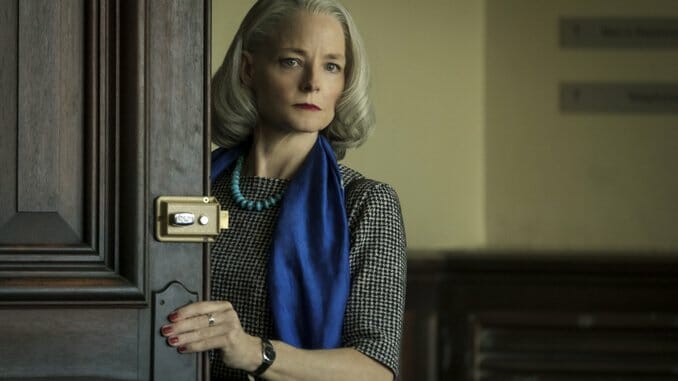Mauritanian, Maur Problems

We’ll be telling stories about 9/11 for decades to come and, unfortunately, most of them will probably be as anodyne as Kevin Macdonald’s The Mauritanian. On the other hand, most of them probably won’t play around a central performance as good as Tahar Rahim’s portrait of Mohamedou Ould Salahi, the man from Mauritania, abducted by Uncle Sam in 2002 and held at Guantanamo Bay until 2016. Allegedly, Salahi advised members of various al Qaeda cells on training in Afghanistan, and in so doing facilitated the terror attacks of September 11th, 2001. Truthfully, if he did or he didn’t, the U.S. government had no case and no evidence and never charged him, which is a major jurisprudence party foul.
Salahi, of course, is innocent, and The Mauritanian spends much of its time with Rahim in interrogation rooms or isolated open-air spaces for compulsory recreational time, or speaking with Nancy Hollander (Jodie Foster) and Teri Duncan (Shailene Woodley), his pro bono defense attorneys, who represent him in part because the latter believes in his innocence and the former believes in habeas corpus. On the opposite side of the investigation stands Stuart Couch (Benedict Cumberbatch), military prosecutor and close friend of one of the pilots who died on 9/11. He has a vendetta. Hollander has a cause. Ultimately they’re fighting for the same thing—justice, though they define “justice” differently—with Salahi caught in the middle as a plaything. Neither American really considers him beyond how he relates to their work: To Hollander he’s just another case, and to Couch he’s an evil fundamentalist mass murderer.
It’s fortunate for The Mauritanian that MacDonald and Rahim both see Salahi as an actual human person. Without that perspective, the film would not only be bland—and it is indeed about as appealing as plain toast—it’d be straight up offensive, a story about two high-powered Americans playing ping-pong with an innocent man’s life for their own unique reasons. Given that the U.S. eventually dropped all allegations against Salahi, and given that Judge James Robertson declared the “evidence” against him thin verging on translucent, the approach Macdonald takes is significantly less repellant: He splits the difference, borrowing from Salahi’s 2015 memoir Guantanamo Diary and stitching together his authorial recollections with standard-issue courtroom drama, in which Foster and Cumberbatch both stare stone-faced at briefs and respond to every setback and revelation met along the way with actorly consternation.
-

-

-

-

-

-

-

-

-

-

-

-

-

-

-

-

-

-

-

-

-

-

-

-

-

-

-

-

-

-

-

-

-

-

-

-

-

-

-

-








































